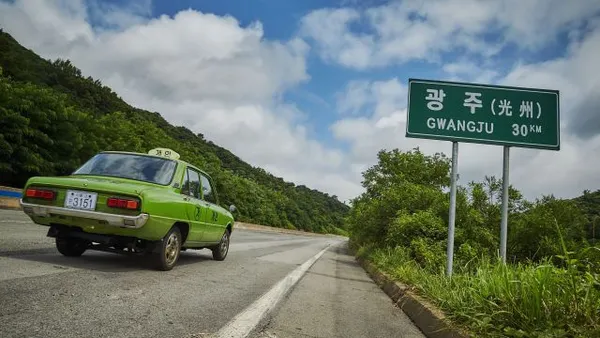Eye For Film >> Movies >> A Taxi Driver (2017) Film Review
A Taxi Driver
Reviewed by: Jennie Kermode

In May 1980, serious trouble was brewing in the South Korean city of Gwangju. The country's president, Park Chung-hee, had been assassinated in October of the previous year and General Chun Doo-hwan had seized control of the military two months later. People in the prosperous southern region of Jeolla objected to his sudden imposition of martial law, which they had been exempt from before. When students protesting at the closure of their universities and demanding democracy where fired on by troops, people from all backgrounds spilled out onto the streets. The result was escalation and the cutting-off of the city so that nobody elsewhere in the country knew what was going on.
A Taxi Driver follows Kim Man-seob (played by Song Kang-ho and based on the real life Kim Sa-bok), a man who doesn't pay much attention to the news anyway. A widower who is behind with his rent and has an 11 year old daughter to worry about, he spends all the hours he can behind the wheel of his ageing but much-loved green cab, trying to make ends meet. When, one day, he hears about a foreigner offering a really big fare to travel all the way from Seoul to Gwangju and back again, he leaps at the opportunity. He doesn't really know what the foreigner is there for and he's startled when they encounter an army road block, but whilst his fare has some mysterious high-minded agenda, what he's concerned with is paying off his landlord and buying his kid some new shoes.

His fare is German journalist Peter (played by Thomas Kretschmann and based on Jürgen Hinzpeter), who is posing as a missionary, and sometimes as a businessman, in an attempt to get inside the city where no foreign media representatives are allowed and even the local press is subject to aggressive controls. His appearance makes him an obvious outsider and he doesn't speak Korean. Kim has only a few words of English, so translations and explanation are difficult, the language gap exacerbated by the difference in the ways they see and understand the world. Initially there is comedy in this. There are any number of films out there which invite us to sympathise with middle class travellers struggling to communicate with locals who claim to speak their language but don't; it's fascinating to see such scenes from the other side, as Kim tries to make what are, to him, very simple and important points, but gets nowhere.
Suffice to say, given the situation that the unwitting taxi driver is getting into, the comedy doesn't last, though enough warm and humorous moments crop up throughout to keep us mindful of how much fun we might be having with these people if things were different. It's a set-up that throws the violence on the streets of Gwangju into sharp relief. There are plenty of films out there that show us scenes like these - often documentary and going on today - but we are used to seeing it through the eyes of seasoned reporters. Kim's initial disbelief and mounting horror give it a very different flavour.
Early scenes of bickering between Kim and the local taxi drivers gradually give way to a sense of solidarity when they catch enough glimpses of his private world to sympathise. He's worried about his daughter and wondering what will happen to her if something happens to him. He's gradually discovering that the rioters talked about in TV propaganda are just protesters, and not even Communists. Strangers offer him food and shelter. This is a side of his own country that he has never really been aware of. His frustration with the journalist who got him into all this melts away, a bond beginning to form between them. But the situation is volatile and it's not clear if either one will survive.
Song is superb in the central role, taking his character through an emotional arc that would be a challenge for any actor, but never less than convincing. Kim can be obnoxious, petty and self-destructive but we always feel for him, and his unexpected situation drives him to find emotional resources he didn't know he had. Kretschmann gives him plenty of space to do his thing, but is also fascinating to watch, particularly in the way he captures the experience of a man following conversations in a language he doesn't understand.
Hun Jang's direction is beautifully balanced, capturing these intimate moments before going on to plunge us into the thick of the action. Scenes of clashes and ensuing panic accurately capture the experience of being in such situations and are often more shocking because they don't linger on individual instances of violence. We are always on the move, witnessing shocking things but not at liberty to linger; forced to focus on staying safe, fleeing, hiding, trying to make sense of it all. The director also captures the strange sense of peace and distance that can develop when events seem overwhelming and instinct takes over from reason. Yet for all this, we never lose track of the moral dilemmas facing Kim, who provides a human reference point amid all the chaos.
Already a big hit in South Korea when it screened as the closing film at this year's Fantasia, A Taxi Driver has historical importance in its homeland but also stands up independently as a snapshot of what journalists in some parts of the world face every day, and a tribute to the unsung heroes who help them. It's also a thrilling film to watch.
Reviewed on: 03 Aug 2017















